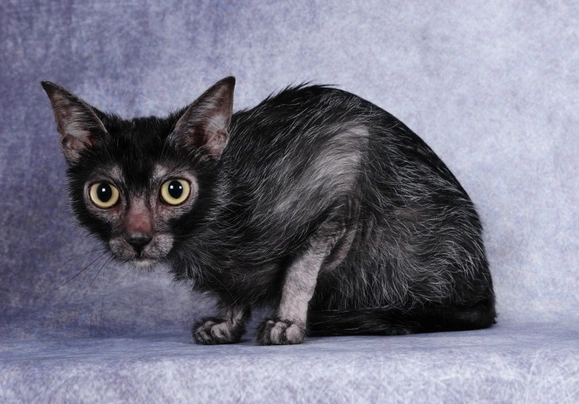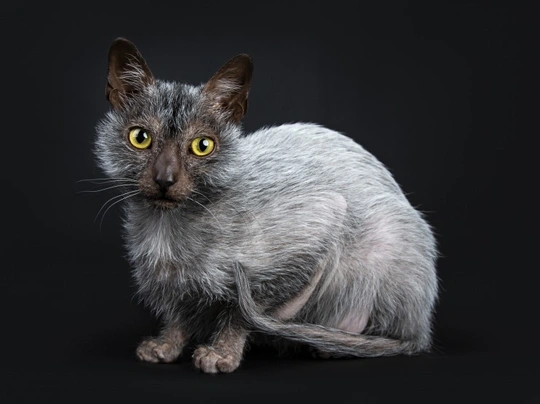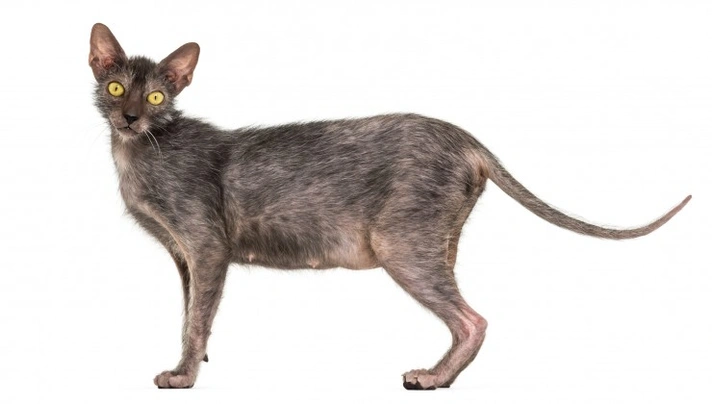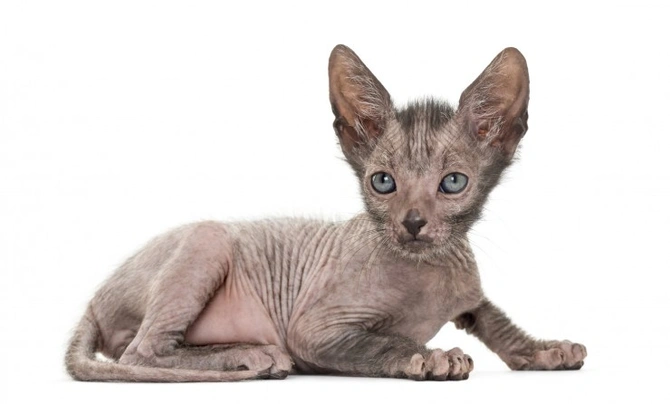Lykoi
Introduction of the Lykoi
Lykois are one of the most recent breeds to appear on the scene having been first registered as a unique breed in 2011. They are medium in size with slender legs and muscular bodies with one of their most striking physical traits being their distinct and unique facial masks. When they moult a Lykoi becomes virtually hairless but at other times of the year some areas of their bodies are covered in hair whereas other parts are not.
Lykois earned their nickname of little wolf cats because of their striking looks. The breed’s name roughly translated from Greek means “wolf”. In keeping with their name Lykois have a strong prey drive but they are also extremely loyal and as such they form incredibly strong bonds with their owners. They are also known to be “thinkers” and will study a new situation before making a move. Because of their sweet natures and their very unique “looks” the Lykoi is finding a big fanbase both in the UK and elsewhere in the world.
History of the Lykoi
The Lykoi is a relatively new breed which was founded in 2011 as a separate breed by three people namely Johnny Gobble Brittney Gobble and Patti Thomas when they were given 2 litters of unrelated kittens that appeared to be quite unique looking. Following in-depth studies into the kittens health and to determine whether they were suffering from any conditions or disease the founders discovered that the Lykoi’s unique looks was due to a natural genetic mutation. As such Johnny Gobble intentionally bred the first ever Lykois.
The mother of one of the litters was a black domestic cat as such more outcrossing to shorthair black domestics cats was undertaken. As time passed it was proven that the gene responsible for a Lykois looks was indeed a recessive one. It was decided to introduce more black domestic cats to reduce the risk of genetic inbreeding.
It is worth noting that even today more Lykoi kittens are born in feral cat populations which can also be used in their breeding programme. Over time it is hoped that with the necessary outcrossing inbreeding would be kept to a minimum which should ensure that the Lykoi is awarded Championship Status with international cat associations although they are already recognised by GCCF (October 2017).
Interesting facts about the breed
- Is the Lykoi a rare breed? Yes Lykois are quite rare with few kittens being bred in the UK. As such a well-bred Lykoi can often command a lot of money
- Lykois are not a “man-made” or designer breed but rather a natural mutation and one that occurs randomly among feral cats
- Kittens are born black but their coats change colour over 1 to 2 weeks which is when the roan colour patterns and the hairlessness appears
- The Lykoi’s unique roan patterned coat and their partial hairlessness is responsible for the breed’s nickname “werewolf cat”
- Although a Lykoi cat’s coat may look coarse it is actually extremely soft and silky to the touch
- The Lykoi was discovered in the USA in a colony of feral cats in 2010
- They were established as a unique breed in 2011
- Other similar looking cats have now been found in feral cat populations in other countries of the world
Appearance of the Lykoi
Ideal weight: Males 2 – 3.2 kg Females 2 – 3.2 kg
There are 3 traits that set the Lykoi apart from other breeds which is their roan colouring which is typically seen in horses their lack of undercoat and the sparse hair on their face masks legs and feet all of which gives the Lykoi the impression of being a werewolf. The overall look of a Lykoi is that of a semi-foreign elegant feline.
They have bright large eyes that are walnut-shaped with very little hair around their eyes noses muzzles and chins. Their ears are set high and erect on a cat’s head which is triangular shaped with nicely rounded contours. Muzzles are moderately long with slightly rounded hairless whisker pads with cats having definite whisker breaks. Chins are well-developed being nicely aligned to the nose which is slightly rounded. The hairlessness around a cat’s eyes their noises and chins creates their unique facial mask.
Their bodies are slender and semi-foreign in shape being elegant and slender with male Lykois being slightly larger than their female counterparts. Necks are moderately long and not overly muscular or thin. Their legs are moderately long and slender being sparsely haired. They have oval shaped feet and nice long toes. Their tails are shorter than a cat’s body and it tapers to a point at the tip.
When it comes to a Lykoi’s coat although it appears to be coarse and rough it is actually extremely soft and silky to the touch with cats not having an undercoat. The most commonly seen colour in the breed is black roan which consists of black hairs mixed in with white hairs which creates a cat’s facial mask and their coat colour contrast.
It is worth noting that a Lykoi does not have an undercoat over their entire body and that guard hairs cover their entire body but these are sparse or lacking on a Lykoi’s face legs feet and the back of their ears. Their coats are as follows:
- Roan colouring consisting of a solid colour with amelanistic white hairs throughout their coats – each hair is either a solid or white colour from root to tip
The accepted range of colour percentage is 30% to 70% with the ideal being 50%. It is also worth noting that solid colours can be intermingled with mink/sepia and point patterns which is acceptable under the Lykoi breed standard and that all colours and patterns including tortoiseshell bicolour blue/cream are acceptable. Cats can also have white lockets belly spots and buttons in their coats.
Faults
When it comes to faults in the breed these are as follows:
- A more than sparse undercoat
- Less than sparse guard hairs
Temperament of the Lykoi
Lykois are extremely intelligent being fantastic “problem solvers” when the need arises. They enjoy company and adore playing interactive games whenever possible. However they are just as happy playing with a toy on their own to keep themselves amused. They also enjoy the company of another cat whether it’s another Lykoi or other breed. They are also known to be very “dog-like” in some of their behaviours and can be taught to “fetch a toy” after it has been thrown for them.
Although they love lots of attention and a warm lap to cuddle up on they are active cats by nature and prefer to be doing something most of the time when they are not sleeping that is. In short a Lykoi has a lot of energy and they like to be kept busy even when kept as indoor cats.
They are social by nature but wary of new situations and people they don’t already know. As such they tend to keep their distance to assess a person or situation to make sure there is no threat.
Are they a good choice for first time owners?
Lykois are a good choice for first time cat owners providing they have the time to dedicate to a hyper active cat that needs to be kept as an indoor pet because of their sparse coats which do not provide them enough protection from the elements.
What about playfulness?
Lykois are extremely fun-loving and active by nature. They boast having very “dog-like” traits which includes being able to “fetch and retrieve” toys that are thrown for them. They also enjoy finding things and are known to be extremely good at problem solving.
What about adaptability?
Lykois are highly adaptable and as previously mentioned they are better kept as indoor pets because of their sparse coats. With this said providing they are given enough daily physical exercise combined with as much mental stimulation to prevent boredom from setting in a Lykoi adapts well to being kept as an indoor cat.
What about separation anxiety?
Although Lykois form strong ties with their families they are very good at keeping themselves amused although they do enjoy the company of other cats and even dogs they have grown up with.
Are they vocal?
Like many other breeds Lykois will hold a conversation when they want something but are not known to be overly vocal.
Do Lykois like water?
Like many other breeds the Lykoi enjoys playing with a dripping tap they are not particularly fond of getting their feet wet. However because it’s important to remove oil from a cat’s skin and around their ears they need to be bathed a little more often than many other breeds which gets them use to water.
Do they get on with dogs?
Lykois are known to get on with dogs but care should be taken when they are introduced to dogs just in case a dog does not get on with cats.
Intelligence / Trainability of the Lykoi
The Lykoi is a highly intelligent cat and one that needs to be given a ton of stimulation to keep them happy. Because they are valuable cats that like to roam most owners opt to keep them as indoor pets and providing a Lykoi has the right amount of company and things to keep them busy they adapt well to being kept as indoor cats. They are extremely good at problem solving which sees them learning to open doors and kitchen cupboards. Lykois are very dog-like in many of their behaviours and because they have a high prey drive they like to stalk anything that moves including people.
Children and other
Lykois with their outgoing affectionate personalities are a good choice for families with children. They are quick on their feet and therefore know when to get out of the reach of smaller children when they get too boisterous or loud. However care has to be taken when very young children are around cats and any interaction should always be well supervised by an adult to make sure things stay nice and calm. With this said children must be taught how to behave around cats and when it's time to leave them alone.
They also get on well with dogs especially if they have grown up together in the same household. Being so gregarious enjoy the company of other animals and much prefer being around them rather than being left on their own. However care has to be taken when introducing a Lykoi to dogs they don't already know just in case the dog does not get on with their feline counterparts.
Health of the Lykoi
The average life expectancy of a Lykoi is between 12 and 15 years when properly cared for and fed an appropriate good quality diet to suit their ages.
The Lykoi is known to be a healthy breed and one that does not appear to suffer from some of the hereditary and congenital disorders that many other breeds are predisposed to inheriting. However the breed is still very much in its infancy and more time is needed to gather information on the sort of health issues that may affect Lykois. With this said because of their sparse coats Lykois are more susceptible to developing hypothermia and in the hotter months they can suffer from sunburn which is why they are best kept as indoor pets.
Caring for the Lykoi
Lykois enjoy it when their skin is washed on a regular basis which helps keep it in top condition coats. They also enjoy playing interactive games like fetch whenever they can which helps keep them fit and healthy. On top of this they must be fed good quality food that meets their nutritional needs throughout their lives and which appropriate for their ages.
Caring for a Lykoi Kitten
Breeders provide a feeding guide for kittens when they go to their new homes and it is important to follow the same routine to prevent any tummy upsets. A kitten should be fed more frequently than an adult cat which means giving them 3 to 4 smaller meals a day which goes a long way in keeping their digestive tracts healthy. The rule of thumb is to feed a kitten little and often throughout the day.
It’s important to give a kitten enough time to settle into their new home which allows the time to get used to everyone including other pets and their new surroundings the noises and smells. Kittens can easily be overwhelmed by things and handling them too much could end up making them nervous and withdrawn. Kittens need to adjust to new things and left to sleep without any disturbances because they need the rest to develop and grow. Introductions to other pets must be done carefully and always be well supervised.
Kittens are incredibly playful and when they are not sleeping young Lykois enjoy nothing more than to be involved in everything that’s going on around them. They are extremely social by nature and enjoy the company of other cats ideally another Lykoi. If not possible they like to be kept busy even when young and will follow an owner around to watch what they are doing and taking everything in.
Being clean cats and intelligent too litter training a Lykoi kitten is generally easy. However litter trays must be kept clean because kittens and cats do not like using dirty litters which is why many of them do their “business” elsewhere. It’s best to avoid litters that “clump” in a kitten’s litter tray because if they ingest even a small amount it could lead to a digestive problem because a clumping litter would swell up and cause a blockage.
It is also important not to tell a kitten off for getting things wrong when they have an accident instead of using their litter tray. If an accident happens gently pick the kitten up and put them in their litter tray as a way of reminding them that is where they go to the toilet.
It’s essential for a kitten to be kept indoors because like all cats Lykois have no road sense when young or as adults and until they are fully vaccinated they are susceptible to contracting a nasty and life-threatening disease namely feline infectious enteritis (FIE) cat flu and feline leukaemia virus (FeLv).
What about when they reach their senior years?
Lykois are extremely people oriented and thrive on human company. They live a long time and when choosing to share a home with one of these extraordinary cats it’s a life-long commitment. As they reach their golden years Lykois slow down and they tend to sleep a lot longer than they did when young and it’s important to respect their rest time. Because they are less active they may lose muscle tone and their joints are stiffer which is when a vet might recommend supplementing their diet with joint supplement.
Older Lykois might become a choosier about their food and it’s important to ensure they are being fed a nutritious diet to suit their advancing years. A cat’s digestive system slows down as they get older which means they find it harder to absorb valuable nutrients. Discussing things with a vet and having an older Lykoi examined if they lose condition would establish if their kidneys are working well and if they are not a vet would recommend a specific diet and prescribe a course of medication to help a cat’s kidney function.
Like many other breeds Lykois are prone to suffering from gingivitis and it’s important for them to have their teeth checked regularly by a vet more especially as they reach their golden years. The best time to arrange for this to be done is when a cat goes to the vet for their boosters.
Older cats often lose a little weight but should a Lykoi lose a lot of weight there could be some kind of underlying health issue that a vet should investigate sooner rather than later.
Grooming of the Lykoi
As previously mentioned the Lykoi needs more regular bathing to remove any excess oils in their skin. Like other breeds they tend to shed the most in the Spring and then again in the Autumn when they tend to loose most of the hair on their bodies.
It's also important to check a cat's ears on a regular basis and to clean them when necessary. If too much wax is allowed to build up it can lead to a painful infection which can be hard to clear up. In short prevention is often easier than cure with ear infections. Cats often suffer from ear mites which is another reason why it's so important to check their ears every week or so.
Exercise of the Lykoi
The Lykoi is a high energy playful intelligent cat and one that likes to be given a tremendous amount of stimulation for them to be truly happy. Most owners tend to keep their pets as indoor cats because although Lykois like to roam the great outdoors being so valuable they run the risk of not only getting injured but stolen too.
Cats kept as indoor pets need to be given lots of things to do and places to hide when they want to bearing in mind that Lykois like nothing better than to stalk their prey and they also like lots of places to snuggle up for a snooze when the mood takes them.
Feeding of the Lykoi
If you get a Lykoi kitten from a responsible breeder they would give you a feeding schedule and it's important to stick to the same routine to avoid any tummy upsets. You can change a kitten's diet but this must be done gradually always making sure they don't develop any digestive upsets and if they do it's best to put a kitten back on their original diet and to discuss things with the vet before attempting to change it again.
Older cats are not known to be fussy eaters but this does not mean they can be fed a lower quality diet. It's best to feed a mature cat several times a day making sure it's good quality food that meets all their nutritional requirements which is especially true for older cats. It's also a good idea to keep an eye on a cat's weight because if they start to put on too many pounds it can have a serious impact on their overall health and wellbeing. Like all other breeds a Lykoi must have access to fresh clean water at all times.
Feeding guide for Lykoi Kittens
A Lykoi kitten’s growth rate is very fast from the moment they are born right up to when they are 4 months old when they should be anything from 5 to 7 times heavier than when they were first born. It’s when their skeletal structure is developing and energy needs are extremely high.
From 4 months right up to when a Lykoi is 12 months old a kitten’s growth rate begins to slow down which allows their skeletal structure to strengthen while at the same time it’s when their muscles develop. It is a time when a kitten’s energy needs are extremely high.
As a rough guide a Lykoi kitten should be fed the following amounts in any 24 hour period making sure they are fed little and often:
- 2 to 3 months – 40g/69g kibble or 12g/45g kibble mixed with ½ sachet of wet food depending on weight
- 4 to 6 months – 55g/77g kibble or 34g/56g kibble mixed with 1 sachet wet food
- 7 to 9 months – 53g/66g kibble or 32g/45g kibble mixed with 1 sachet wet food
- 10 to 12 months – 44g/58g kibble or 23g/37g kibble mixed with 1 sachet wet food
Feeding guide for an Adult Lykoi
Adult Lykois should be fed a good quality diet to suit their ages. As a rough guide an mature Lykoi should be fed the following amounts in any 24 hour period:
- Cats weighing 2 kg can be fed 30g/40g of kibble or 12g/20g of kibble mixed with 1 sachet of wet food depending on activity
- Cats weighing 3.2 kg can be fed 35g/45g of kibble or 18g/26g of dry kibble mixed with 1 sachet of wet food depending on activity
Lykoi price
If you are looking to buy a Lykoi you would need to pay upwards of £60 for a well-bred pedigree kitten and you would need to register your interest with breeders and agree to being put on a waiting list because not many well-bred kittens are produced every year. The cost of insuring a male 3-year-old Lykoi in northern England would be £18.21 a month for basic cover but for a lifetime policy this would set you back £29.45 a month (quote as of October 2018). When insurance companies calculate a pet's premium they factor in several things which includes where you live in the UK a cat's age and whether or not they have been neutered or spayed among other things.
When it comes to food costs you need to buy the best quality food whether wet or dry making sure it suits the different stages of a cat’s life. This would set you back between £10 - £15 a month. On top of this you need to factor in veterinary costs if you want to share your home with a Lykoi and this includes their initial vaccinations their annual boosters the cost of neutering or spaying a cat when the time is right and their yearly health checks all of which quickly adds up to over £450 a year.
As a rough guide the average cost to keep and care for a Lykoi would be between £30 to £45 a month depending on the level of insurance cover you opt to buy for your cat but this does not include the initial cost of buying a well-bred GCCF registered Lykoi kitten.



